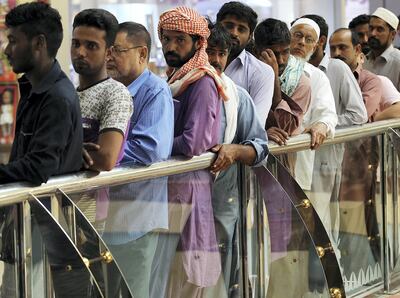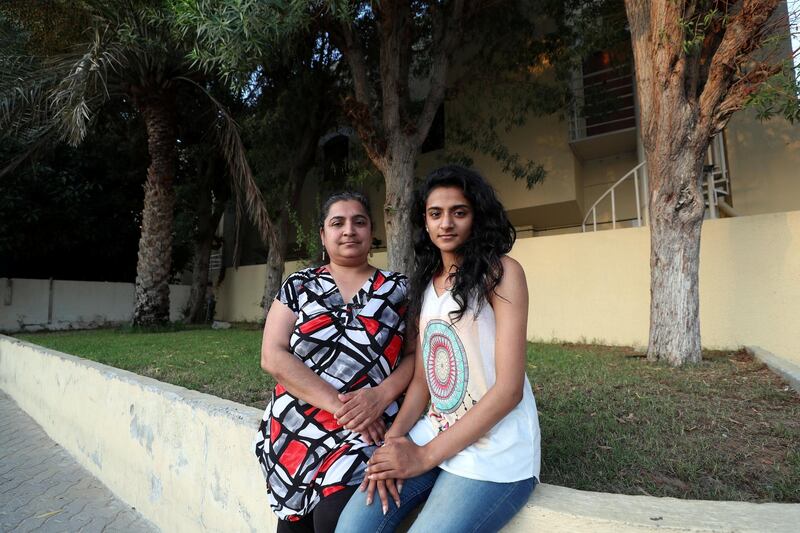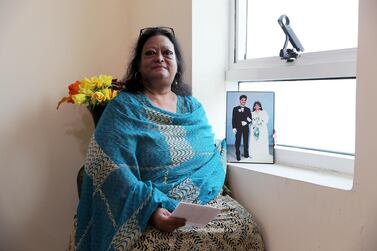An Indian mother who secured her family's future in the UAE under the country's visa amnesty programme has hailed the scheme for providing a 'miracle' answer to a decade of troubles.
Anita Bhatia has been trapped in legal limbo since 2010, when her Dubai employer accused her of misappropriating company funds and took her to court.
The claim - which she continues to refute - set off a chain of events that changed her and her family's lives forever.
She served five months in prison and was hit with a travel ban, denying her the opportunity to start life afresh outside of the UAE.
Due to her legal battles, her passport was held by police which meant she could not renew her children's visas.
Her own employment visa also lapsed in 2013, while she faced the daunting task of supporting her two children alone, after her husband returned to India following the death of his father in 2010.
“The amnesty is the big miracle in our lives,” said Ms Bhatia, 42, who finally secured a work visa on Sunday, June 16, and started work a day later.
“Since 2013 we have had no visas. I had court cases against me so I would explain to police, immigration and education authorities that until I cleared all this, I could not get official documents.
“I decided long ago that I must clear my name one step at a time.”
Her travel ban was subsequently revoked in 2017 when a civil case was resolved in her favour.
She then applied a year later for a temporary visa during the amnesty programme.
Ms Bhatia got a job just in time, as her temporary six-month job seeker visa issued by immigration authorities in December would have run out on June 30.
Invaluable financial aid from volunteers of a charity group, a Dubai church and a small group of friends, combined with the support of immigration and education authorities and the Indian consulate helped her keep her children in school in those difficult years.

Her daughter Gunjan, 20, is now studying psychology in college and her son Raj, 13, is in grade seven in a British curriculum school.
Ms Bhatia is among thousands of residents who have rectified their status by finding employment.
People whose visas had expired had the chance to leave the country without paying fines or could adjust their residency status during the UAE government’s amnesty programme, that ran from August 1 to December 31 last year.
“There were times we had no food to eat, no money to pay bills or fees and then somebody would call and help out. I used to cry, I have been terrified but I had faith that this time would pass,” said Ms Bhatia, who has lived in Dubai for the last 27 years.
But she still needs to clear one ongoing court case related to the breach of trust charge.
“The government and immigration staff helped us a lot because they allowed my children to study without identity papers. We told the truth about the court cases against me.”
The family lives in a small room in an apartment they share with another couple in Sharjah.
As primary caregiver, Ms Bhatia wanted the children with her in the UAE so she could watch over them as she could not leave the country due to legal restrictions.
Both mother and daughter lean on each other through their troubles.
Gunjan said she has drawn strength from watching her mother fight tirelessly to keep the family together.
“I thought if my parents can smile, then why can’t I,” said Gunjan who hopes to study for a masters and PhD degree in psychology counselling and plans to use art therapy to work with children with special needs.
“There were times I was very scared like when I was very young and my mother was in jail.
"We don't have much. We can't afford luxuries, our clothes and shoes are given by cousins or my mother's colleagues. We often survive on dal (lentil curry) and rice but we have each other."
Gunjan smiles when she hears fellow students at Middlesex University Dubai speak of their academic challenges or arguments with parents.
“Very few people know our story. When I hear students in my college say, ‘Life is hard,’ I think, “Yeah right. You live in a villa. You don’t need to worry about food or fees.
“We have never had a father figure in our life because our dad is far away. But seeing my mother word hard motivates me to face life.”
The family came forward to tell their story as the validity of thousands of amnesty visas will expire by the month-end and residents must either leave the UAE or get jobs to change their status.
They want others in similar situations to believe they can resolve problems by engaging with authorities.
“I want to tell people not to hide,” Ms Bhatia said.
“They too can find a way and let the children continue their studies. I want to tell them to talk to the authorities because there will be a solution.”
What was the UAE's amnesty programme?
The UAE government launched an amnesty programme from August 1 to 31 December last year
Residents without valid visas had the opportunity to either leave the country without paying fines or could remain and change their residency status
People who had overstayed their visas could exit without paying fines, would not be imprisoned nor would they face a ban on re-entry
Alternatively, they could rectify their status by finding a job and getting a new sponsor
The UAE amnesty programme covered violations before August 1, 2018 only
The programme granted people a grace period to settle their status or to leave the UAE voluntarily without legal consequences or fines
People keen on staying in the UAE could obtain a six-month self-sponsored temporary visa
Job seekers could look for employment by registering for jobs on the website of the Ministry of Human Resources and Emiratisation
People with varying visa issues were considered under the scheme
Those who had entered the country illegally would be given amnesty by exiting the UAE with two-year ban but without any fines
People against whom absconding reports had been filed could apply for amnesty and leave the country without a ban
Residents of countries affected by war and disasters were given residence visas for one year regardless of their residency conditions
The visa of widows or divorced women, and of their children, was extended for one year without the need for a sponsor







